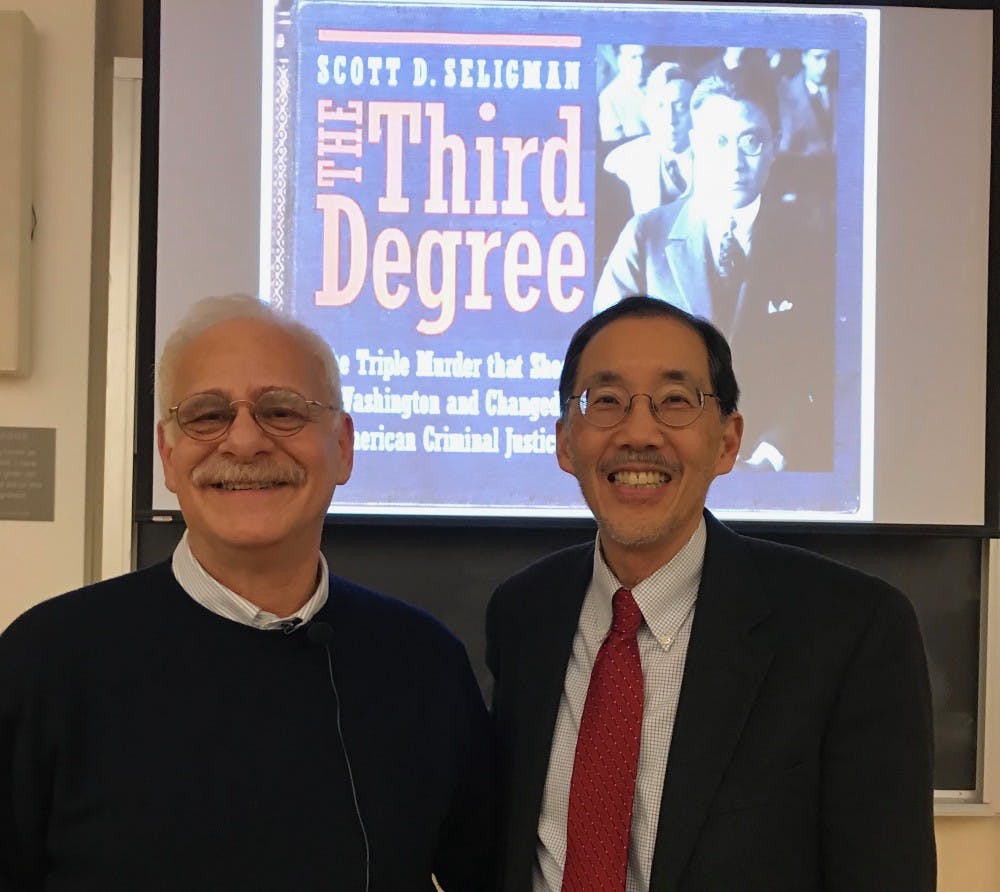Historian and writer Scott Seligman delivered a talk on the history of Miranda rights — and the University’s connection to the landmark Supreme Court case establishing them — Thursday evening as a part of a lecture series presented by the East Asia Center. The discussion was based on Seligman’s book entitled “The Third Degree: The Triple Murder That Shook Washington and Changed American Criminal Justice.”
Seligman discussed the 1919 murder of former University student and Chinese diplomat Theodore Wong, who was found shot to death along with two other Chinese diplomats at the Chinese Educational Mission in Washington, D.C. Wong attended the University from 1894 to 1897, though he ultimately transferred to Georgetown University where he finished his degree. After returning to China and passing his civil service exam, Wong came back to the U.S. where he was the head of Overseas Students in America, an organization which oversaw international students studying in the states.
“There’s a U.Va. connection to this, not so much about the Miranda aspect of it but because [Theodore] was the first Chinese [student] to come here,” Seligman said.
When police found a murder suspect, Ziang Sung Wan, Seligman said the authorities held him against his will, withheld food and water and used racial epithets in an attempt to get a confession. After nine days of interrogation, Wan admitted to the murders though it was a result of what Seligman described as a “third degree of deep interrogation.”
Wan attempted to recant his statement in his trial but was sentenced to death. In an effort to appeal his verdict on death row, his attorneys sought to have the case reviewed by the Supreme Court. The case decision was written by Justice Louis Brandeis, the only civil libertarian on the court, exonerating him from the murder.
“Justice Brandeis basically said … there is only one criterion for admission in a federal court of law and that’s not promises or threats by the police,” Seligman said. “It’s voluntariness. This was not a voluntary confession.”
Wan was tried two more times for murder but was released after both trials ended in deadlocked juries. His case, Ziang Sung Wan v. United States (1924), set the basis for the landmark 1966 Supreme Court case Miranda v. Arizona, which required law enforcement to inform defendants of their right to remain silent, the right to consult with an attorney in the questioning process and that an attorney will be provided to them if they can’t afford one.
“Justice Warren, who wrote the Miranda decision, quoted from Brandeis,” Seligman said. “This case was one of the seminal cases that they used and they got the language from it that was part of Miranda.”
Seligman related the Miranda decision to today, saying it still has implications regarding minority treatment and abuses while in custody.
“One of the underlying themes of this thing is that minorities are not treated so well in our system very often,” Seligman.
Seligman said his inspiration for the book came from browsing the Library of Congress website where he searched the key words “Chinese” and “murder.” The story of the 1919 murders was one of the first hits that came up.
“I thought, ‘Why not? I’ll write about true crime,” Seligman said.
Seligman’s discoveries after unveiling the case have connected him to Theodore Wong’s family members all over the world, but when he found Erica Ling, one of the great granddaughters of Theodore Wong, she was living only a block away from Seligman’s home in Washington, D.C. Their connection has brought them back to the University to share the story.
“We knew that he had been murdered but nobody ever wanted to talk about the details. I just appreciate hearing the history and it has been great becoming friends with Scott too,” Ling said. “Education has always been important in my family so it’s nice to know where that had its roots.”
Seligman has connected with other members of Wong’s family through Facebook, some of which he had met unknowingly while serving on the American Chamber of Commerce Board in Beijing. Among the relatives is University Law Prof. George Yin who discovered his relation to Wong last spring. Yin also learned he is related to W.W. Yen, the University’s first Chinese graduate and its first international student to earn a bachelor of arts degree.
“I’ve been adopted into that family,” Seligman said. “This has pushed me in ways I’ve never been pushed before.”
The lecture series on East Asian affairs, which started in 1974, precedes the conception of the East Asia Center at the University. The series has continued since the center’s creation in 1975.
Administrative Coordinator for the East Asia Center Jo Watts said in an email to The Cavalier Daily Seligman’s talk will be the final presentation of this fall’s lecture series, but there will be more topics to look forward to in the spring.
“On the schedule, we already have talks on China & the Denuclearization of North Korea, the anthropological importance of the Pearl River Delta on the South China Sea, and archaeology in Buddhist cave temples,” Watts said.







